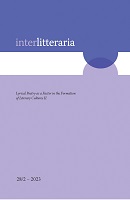Christian Felix Weiße’s Poetry in Latvian and Estonian Literature
Christian Felix Weiße’s Poetry in Latvian and Estonian Literature
Author(s): Ave Mattheus, Pauls DaijaSubject(s): Estonian Literature, German Literature, Latvian Literature, 18th Century, 19th Century, Translation Studies, Sociology of Literature
Published by: Tartu Ülikooli Kirjastus
Keywords: Christian Felix Weiße; Latvian literature; Estonian literature; translation of poetry; cultural transfer; Age of Enlightenment;
Summary/Abstract: The article analyzes the translations of Christian Felix Weiße’s poems in Latvian and Estonian within the context of cultural transfer during the age of Enlightenment. Translations of Weiße’s poems were of great significance because they paved the way for the emergence of secular poetry in both languages. First translations appeared in the 1770s, and others followed in the next decades. While the first Latvian translations were connected to the popular enlightenment efforts of Baltic German pastor Gotthard Friedrich Stender and addressed to the peasant readers, the first Estonian translations were written in the context of experiments with the language and addressed to the Baltic German intellectual elite. First translations that were addressed to Estonian peasants appeared in the early 19th century. The frame of reference of the poems was transformed when they were addressed to peasant reading public: they acquired didactic meaning. At the same time, these translations demonstrated the poetic possibilities of Estonian and Latvian languages. The analysis as a case study reveals the multifaceted influence of German poetry on Estonian and Latvian literary cultures.
Journal: Interlitteraria
- Issue Year: XXVIII/2023
- Issue No: 2
- Page Range: 239-259
- Page Count: 21
- Language: English

